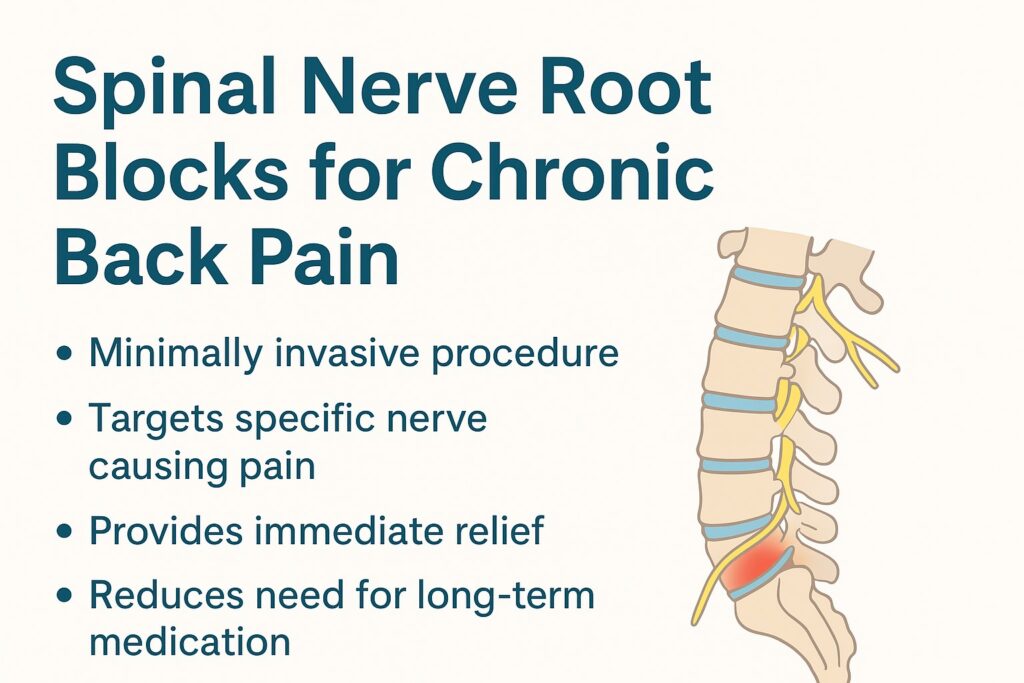Chronic back pain is one of the leading causes of disability worldwide, limiting mobility, affecting daily activities, and reducing quality of life. When conservative treatments such as medications, rest, or physiotherapy fail to provide relief, advanced interventional pain management procedures can offer hope. One such effective technique is the Spinal Nerve Root Blocks, a minimally invasive procedure designed to target the exact source of pain.For patients searching for the best chronic back pain treatment in Delhi, understanding spinal nerve root blocks can help them make informed decisions about their health.

What is a Spinal Nerve Root Block?
A spinal nerve root block injection is a targeted treatment that involves injecting a local anesthetic and steroid medication around an inflamed or irritated spinal nerve root. Using advanced imaging guidance, an interventional pain specialist ensures the medication reaches the precise nerve responsible for pain.
This procedure serves two important roles:
-
- Diagnostic – Helps identify the exact source of nerve-related back pain.
-
- Therapeutic – Provides pain relief by reducing inflammation and irritation.
Unlike oral painkillers that affect the entire body, nerve root block injections work locally, making them highly effective for many patients.
Benefits of Spinal Nerve Root Blocks
Spinal nerve root blocks are increasingly chosen for chronic back pain management due to their multiple advantages:
-
- Minimally invasive – No stitches, minimal downtime.
-
- Quick procedure – Typically done in less than 30 minutes.
-
- Effective pain relief – Many patients report improvement within days.
-
- Improved mobility – Helps patients return to physiotherapy and daily activities.
-
- Surgery-sparing option – Reduces or delays the need for invasive spinal surgery.
This makes it an excellent choice for patients who want non-surgical back pain treatment.
When is a Nerve Root Block Recommended?
Doctors may recommend a nerve root block injection for:
-
- Lumbar disc herniation causing leg pain (sciatica)
-
- Spinal stenosis leading to nerve compression
-
- Cervical nerve pain radiating to arms and shoulders
-
- Degenerative disc disease
- Degenerative disc disease
-
- Persistent pain after spine surgery
- Persistent pain after spine surgery
By targeting the affected nerve directly, the procedure not only relieves pain but also confirms the diagnosis of nerve root involvement.
Why Choose Dr. Vrishit Saraswat?
When it comes to spinal interventions, choosing the right specialist ensures both safety and effectiveness. Dr. Vrishit Saraswat is a highly trusted name in interventional pain management in Delhi.
-
- Advanced Training from Medanta
-
- National Recognition
-
- Personalized Patient Care
-
- Virtual Consultations
FAQs
Q1:How long does a nerve block last for back pain?
Pain relief can last from several weeks to a few months. Some patients may require repeat injections for long-term benefit.
Q2: What is a nerve block for chronic back pain?
It is a targeted injection of anesthetic and steroid near a spinal nerve root to reduce inflammation and relieve pain.
Q3: Is a nerve block injection safe?
Yes. When performed by an experienced specialist under imaging guidance, nerve blocks are safe with minimal risks.
Q4:What is the next treatment when a nerve block has not worked?
If nerve blocks do not provide relief, other options like radiofrequency ablation, advanced spine injections, or minimally invasive surgery may be considered.
Q5:What are the disadvantages of a nerve block?
Possible drawbacks include temporary numbness, limited duration of pain relief, and rarely, infection. Serious complications are very rare.






